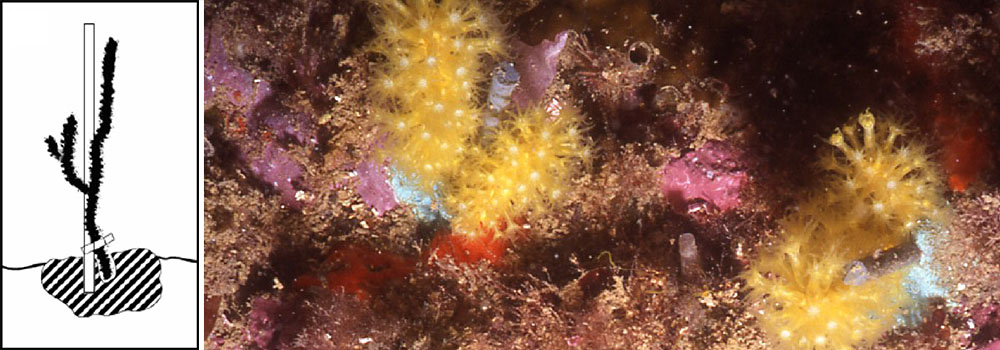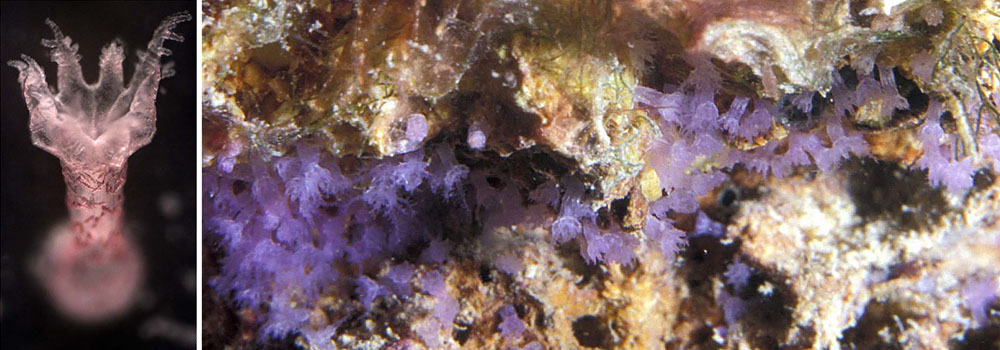The aim of the MedRecover research group is to obtain further information on the consequences of global change in marine ecosystems. The group identifies and characterises impacts on marine biodiversity, and develops the capacity to foresee future changes and implement restoration measures in marine communities. To achieve these objectives, MedRecover has adopted a multidisciplinary approach to integrate different levels of biological organisation, from individuals to communities, as well as relevant time and space scales.
OBJECTIVE 1
To assess the impact of strong disturbances associated with global change (i.e. fisheries, invasive species and climate change)
Acquisition and analysis of long-term series of environmental and biological parameters
To evaluate the effects of perturbations, baseline data must be gathered so that we can distinguish between natural variability and the impact of disturbances. Therefore, one of MedRecover’s main activities is to continue the large-scale time series that were started in the early 1990s. This is achieved by annual surveys of different key species’ populations (fish, gorgonian, algae, urchins and lobsters) in several marine reserves and in nearby areas that have no protection, mainly on the Catalan Costa Brava, the Balearic Islands, the French coastline and the Island of Corsica. The arrival of invasive species have been also taken into account since the beginning of 2003.
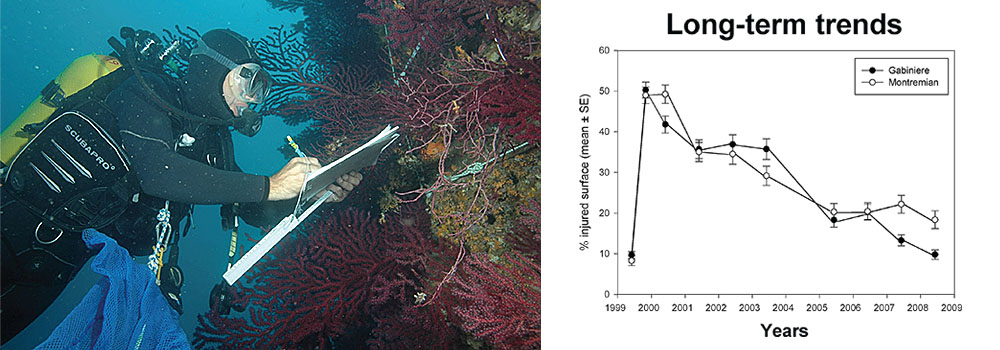
Besides biological surveys, MedRecover has actively participated in the acquisition of high resolution temperature series in the NW Mediterranean (www.t-mednet.org). At present, there are 12 stations, distributed in the Balearic Islands and the NE Spanish and French coast. Each station is equipped with automatic temperature sensors that obtain hourly measurements within a range of 5 to 40 metres of depth. In the context of studying the effects of climate change, the acquisition of these series is a key factor for in-depth analyses of the relation between thermal conditions and biological response.
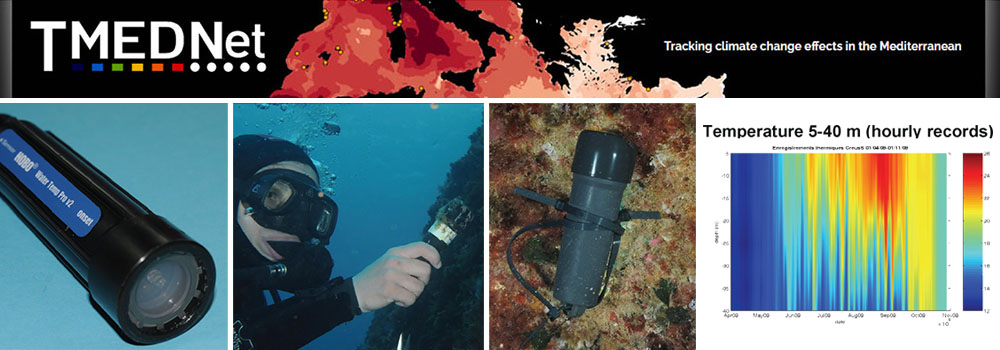
Research into guidelines and the definition of conservation objectives
The comparison between areas that are subjected to different levels of anthropogenic pressure enables us to determine the level of degradation of ecosystems with regard to pristine baselines. The determination of these baselines is required to define the conservation objectives that should guide management initiatives. At present, MedRecover is evaluating the state of conservation of algae communities in the Mediterranean through a comparative study on the abundance of groups of key organisms in these communities (fish, algae and urchins) in areas of the NW Mediterranean, the Adriatic and the NE Mediterranean (Greece and Turkey) that are subjected to different degrees of anthropogenic pressure. In the next years, we extend this type of large-scale comparative study to coralligenous communities in the Mediterranean within the project medDiversa.

OBJECTIVE 2
To develop predictive tools that can be used to anticipate the effects of disturbances and of potential management measures
Modelling the demography of key species: population viability analysis
The acquisition of long time series on demographic parameters of different key species enables the development of robust population viability models (PVAs). This type of models was applied for the first time to the red gorgonian Paramuricea clavata in Dr. C. Linares’ PhD. The PVA was used to explore possible effects of recurring strong disturbances and also to demonstrate the effects of management actions on diver’s visits on the viability of gorgonian populations. At present, the same kind of models are being developed for the red coral Corallium rubrum. The experience will be used to extend this type of model to other MedRecover model species.
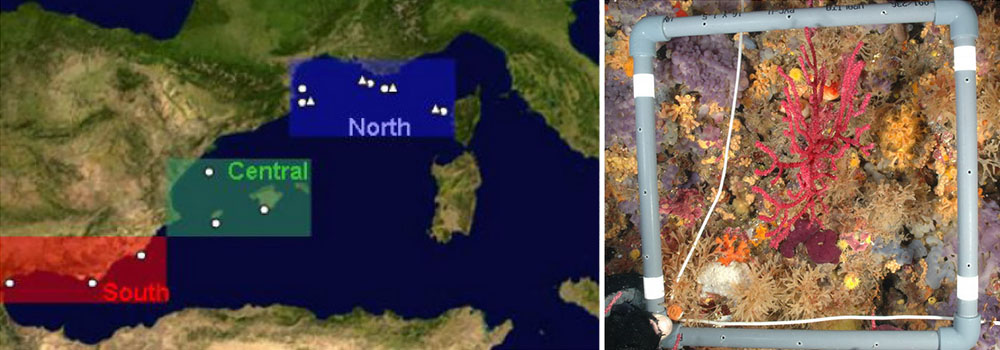
OBJECTIVE 3
To identify measures for mitigating the impact of disturbances and to propose specific actions for restoring the biodiversity of coastal ecosystems
Restoration of endangered populations
MedRecover is studying the viability of different transplantation methods for long-lived species that have suffered serious impacts in past decades, such as algae from Cystoseira and gorgonian species. These studies go beyond the establishment of transplantation techniques: they also analyze the efficiency and possible consequences of these actions using modelling approaches. These analyses have shown that transplantations could effectively increment the viability of degraded gorgonian and Cystoseira spp. populations.
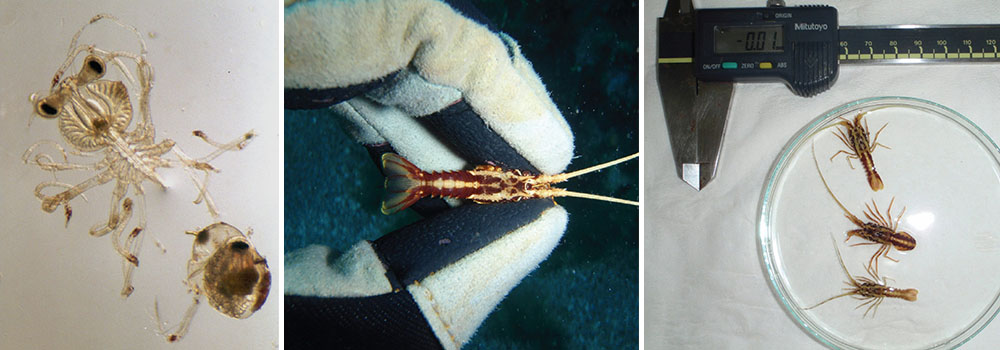
OBJECTIVE 4
To evaluate the effectiveness of conservation measures, in particular the effects of marine reserves
Study on species mobility through radio-tracking. Evaluation of the effectiveness of reserves for biomass exploitation
One of MedRecover’s major achivements in recent years has been the implementation of telemetry techniques to study mobility on fish and large crustaceans’ species. This approach can help to gain an understanding of the functioning and effectiveness of marine reserves in terms of the conservation of fished species. For instance, in a study in Belize on Nassau groupers, these techniques enabled effective management measures to be implemented, and led to the partial closure of fisheries of this species to guarantee its persistence.
Currently, we are studying the movements of fishes and large decapods in Mediterranean marine reserves. This study will enable us to evaluate the capacity of protected areas to recover overexploited species within their boundaries, for the exploitation of biomass outside of the reserves. It will also provide basic data on the behaviour of these species.
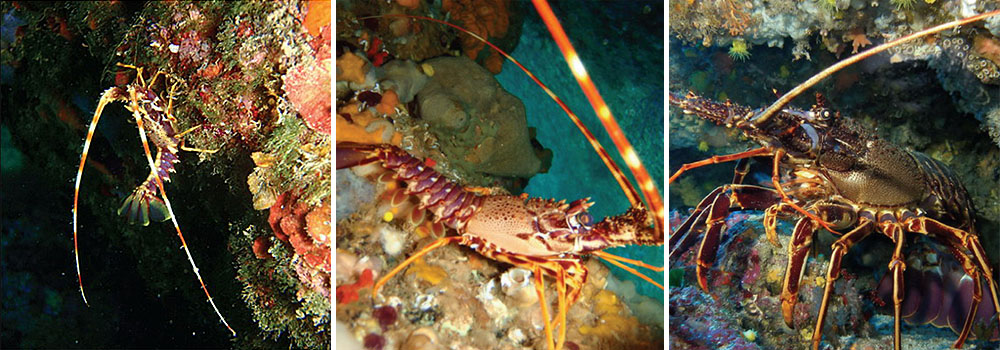
OBJECTIVE 5
To study the biology and ecology of endangered species and communities
Study of the biology and ecology of endangered species and communities
The analysis of long-term data at large geographic scale and the modelling of population dynamics raise essential questions on the ecology and biology of the species studied. We constantly work to find answers to these questions, since they are relevant to conservation measures. Through a combination of observational and experimental studies, we have been able, for instance, to obtain key information on the processes that regulate the dynamics and functioning of algae communities, gorgonians life history traits and their levels of thermotolerance, and, more recently, the genetic population structure of some of our model species.
